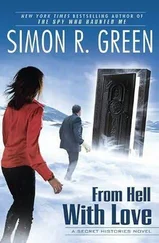“Could be,” said Agatha, opening up her roll and looking gloomily at a piece of sweating cheese and a leaf of limp lettuce. “It all seems hopeless, but I’ve got to go on. Somehow, if I stop ferreting around, I’ll sink back into misery again.”
“I know,” said Charles. “When we finish this, we’ll call in at police headquarters and ask for Bill. Maybe he’s heard something.”
Agatha ate what she could. Charles finished his and then ate what she had left on her plate.
“Getting hot,” he said as they emerged into the sunlight.
They walked to police headquarters, asked for Bill Wong and were told to wait. Some attempt had been made a long time ago to brighten up the reception area, but various potted plants were dying or dead and the magazines on the scarred table in front of them were years old.
Finally the desk sergeant called them over and pressed a buzzer so they could go through to the back. Bill was waiting for them in the corridor. “We’ll use this room,” he said, pushing open the door of an interview room. When they were seated, he asked, “What’s new?”
“We came to ask you that,” said Agatha.
He spread his hands. “Nothing. No news of James at all. His photo’s been in all the newspapers and on television. We’ve checked the ports and airports. Nothing.”
“Are you concentrating solely on him?” asked Agatha. “I mean, if you do that, you’ll be letting the real murderer escape.”
“We’ve interviewed everyone we can think of. I mean, we don’t understand it. Those villages like Carsely are gossip shops. Yet, we get this murder, Lacey is attacked, no one sees a thing. Agatha, are you sure you didn’t just have one of your rows with James and throw something at him?”
“No, I did not. And I was away all that evening.”
“So you were.”
“You bugging my phone?”
“If we were, I wouldn’t tell you. But I don’t know. I’m still too low down the ranks to know that sort of thing. If someone’s phone is bugged, they need to get permission from the Home Office.”
“We’ve got a likely suspect,” said Agatha.
“I thought I told you pair not to interfere. Anyway, who is it?”
“Luke Sheppard.”
“Oh, him. He’s got an alibi for the time James was attacked. We cannot exactly pin-point the time of Melissa’s death, but it was sometime during the night five days before her body was found.”
“And what was Luke Sheppard’s alibi for the evening James disappeared?”
“He was at a Rotary Club meeting all that evening.”
“And the night Melissa was killed?”
“He and his missus were having a romantic night in the Randolph Hotel in Oxford. It was her birthday celebration.”
“Rats!” Agatha stared at him moodily.
“We were trying to build up a picture of Melissa,” said Charles. “You know, trying to find out if there was anything in her character or behaviour that would cause someone to murder her. Did you find out anything?”
“Only that she was regarded as the perfect village lady. Divorced two times and both amicable divorces.”
“What we did find,” said Charles, “was that, according to Sheppard, she was a fantasist, acted out roles she saw on television. She was addicted to soaps and detective series, and fancied herself as bit of a Miss Marple. She may just have dug up something that someone didn’t want her to find out.”
“It’s a possibility, but a remote one. If only we could find James Lacey, we might have a clearer picture. But we are trying. We haven’t given up on the case. So keep out of it.”
“You didn’t used to be like this before,” said Agatha mournfully. “You used to be glad of my help.”
“That was before you nearly got yourself killed on several occasions. You may not realize it, but I am fond of you, Agatha.”
“Now you’ve done it,” said Charles, as fat tears began to spill down Agatha’s cheeks.
“What did I say?” asked Bill, as Agatha mopped her face.
“She’s a bit fragile. Come on, Aggie, let’s get going.” Charles put a hand under her arm and helped her to her feet.
♦
Turnpike Lane, Worcester, where Melissa’s first husband lived, turned out to lie in the outskirts of the town in a modern housing development. “You want to go on with this?” asked Charles, as he parked outside number 5.
“Yes, I’m all right.”
“You’ve got a soft centre after all, Aggie.”
“How many times do I have to tell you not to call me Aggie? My husband may be dead, he is suspected of murder, and that’s enough to upset anyone. Now are we going to talk to this man or not?”
They got out of the car and stood looking at the house. It was raw-looking, the stone a harsh yellowish colour, and was surrounded by identical houses. “He hasn’t bothered much about the garden,” commented Charles, looking at the weedy earth in front of the house, which was still dotted with bits of builders’ rubble.
Charles rang the white bell-push on the white-painted door. Agatha was once more struck by the fact that there were no children playing about. Children rushed indoors after school these days to surf the Internet or watch television or play computer games.
A woman walking a dog stood at the garden gate and studied them. “Want anything?” called Agatha.
“I represent Neighbourhood Watch in this area,” she said, “and I haven’t seen you before.”
“Well, now you have,” snapped Agatha. “And I’ve got a gun. Bang, bang, you’re dead!” She turned back and stared impatiently at the closed door.
She was just about to say to Charles that it did not look as if their quarry was at home, when the door opened a crack and one pale eye surveyed them.
“Mr. Dewey?” said Agatha.
“I’m not buying anything.”
“We’re not selling anything,” said Agatha crossly. “I am Mrs. Agatha Raisin and this is Sir Charles Fraith. We would like to talk to you.”
“What about?”
“Melissa Sheppard.”
“Oh, her.” The door swung open.
“Everything all right, Mr. Dewey?” called the woman at the garden gate and her dog gave a shrill bark.
“We’re only here to shoot him,” called Agatha to the woman. She turned back. “Do let us in, Mr. Dewey. We can’t talk on the doorstep with that tiresome woman watching us.”
“Come in.”
Charles took a look back down the garden path and saw the representative of Neighbourhood Watch pull a mobile phone out of her pocket. He felt he should say something, but Agatha was already walking into the house, so he gave a shrug and followed her.
The small living-room into which Mr. Dewey led them was as characterless as the outside of the house. Fitted brown carpet covered the floor. There was a new three-piece suite, the sofa having a shell-shaped design. One coffee-table in plain wood. No pictures, photographs, books or magazines softened the starkness of the room. Agatha wondered if he lived in the kitchen.
“Mr. Dewey,” she began when they were seated.
“John,” he said. “You may call me John.”
A small, slight man with closed features and gold-rimmed glasses, he was wearing a white T-shirt, jeans with ironed creases down the front, glittering white sneakers and, over his clothes, a plastic apron decorated with fat roses which reminded Agatha of Megan’s cups.
“Well, John,” she said, “you may have read about us in the papers.”
“Yes, you’re that woman whose husband killed Melissa.”
“That’s just the point. We don’t think he did. Before he disappeared, he was attacked and we think that whoever attacked him killed Melissa.”
“I don’t see the point of these questions,” he said. “I mean, I’ve told the police all I know.”
Читать дальше












